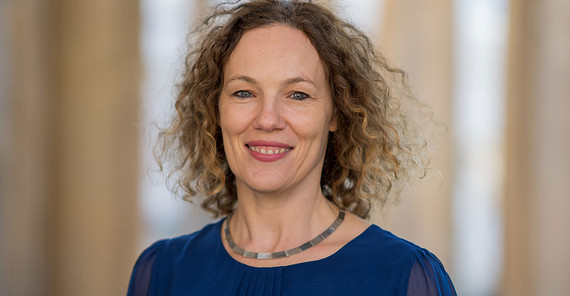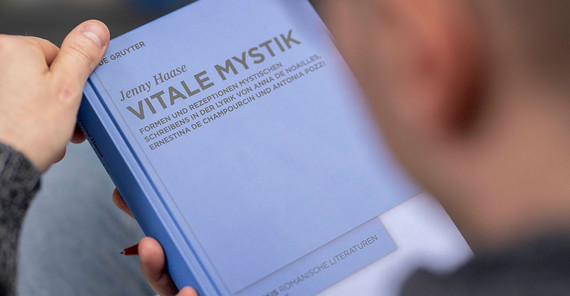A broad but also rewarding field in which Prof. Haase sets her own emphases and conducts interdisciplinary research: modern lyric poetry, feminist narrative voices, post- and decolonial discourses, religion and secularization, and Latin American ecocriticism in contemporary literature. Together with her students, the researcher reads contemporary French novels, discusses Latin American performance and video art, invites guest lecturers, and talks about environmental crises in a global context.
Whether lithium mining in the Atacama Desert, expanding salmon farms off the coast of Chile, the timber industry, or dam projects on indigenous land – how do artists from the Global South engage with eco-social crises? Is it possible to gain a different perspective on Latin America, one to which we in Europe may have been blind so far[SV1] ? And how can both perspectives enrich each other through dialogue – mutually and on equal footing?
In the academic structures of other countries, it is not so easy to accommodate these and other questions on a variety of topics within a single professorship. “In the USA, for example, many of the subject areas that we combine in Romance studies are separate disciplines,” says the researcher, who spent two years as a postdoc at Stanford University. “In German Romance studies, we have a philological tradition and at the same time a cultural studies perspective, as it prevails in Latin American studies. The two complement each other well.”
Expert on Literatures and Cultures of "Global Romania"
She also unites these two qualities in herself. In her habilitation thesis “Vital Mysticism”, the literary scholar examines mystical elements in the works of modern female writers, who borrowed them from Catholicism and transgressively reshaped them. The research was honored by the University of Freiburg with the Hugo Friedrich and Erich Köhler Prize. The 46-year-old’s fascination with foreign languages and cultures has accompanied her since youth. Haase learned English, French, and Spanish at school, and later added Italian and Catalan during her university studies. As a teenager, she spent six months in France on a student exchange. Before moving to Göttingen, Barcelona, and finally Berlin for her studies, the young woman lived in Santiago de Chile for six months, backpacked through the Andean country, and was inspired by the people and their culture.
An enthusiasm and joy that she now wants to pass on to her students. “Life and work are often not clearly separated in our fields of research, and I believe this is especially true for Romance studies. Here in Potsdam, the subject is strongly oriented towards the teacher training program for Spanish and French. It is essential that prospective teachers not only impart knowledge of languages and cultures but also inspire the desire to gain personal experience abroad.”
Making Latin American voices heard
This is when the Latin American scholar Jenny Haase speaks, who repeatedly travels to countries such as Colombia or Chile and is particularly fond of the southern tip of the continent. What others associate at best with outdoor clothing or exotic performances is for Haase an object of cultural studies. As a student, she began collecting texts and novels related to Patagonia. During her doctoral studies, Haase critically examined the region and the sometimes adventurous romantic image depicted by European literature, especially the bestseller “In Patagonia” by British writer Bruce Chatwin. In his footsteps, Haase traveled through the country in the 2000s with a curious eye. In doing so, she looked at the region both from an outsider perspective and through the eyes of Argentine and Chilean writers. Her doctoral thesis “Patagonia’s Intertwined Narrative Worlds: The Argentine and Chilean South in Travel Literature and Historical Novel (1977 – 1999)”, submitted at Humboldt University in Berlin, was awarded the Elise Richter Prize of the German Romance Studies Association in 2009.
For December 2025, Prof. Haase is planning a conference on post-humanist approaches from Latin American and indigenous perspectives, together with colleagues from South America, the USA, and Germany. It will focus on the questioning of anthropocentric worldviews through other conceptions of the human as a subject that is inextricably intertwined with its environment. After all, important impulses for the humanities come from the Global South. “From a Latin American perspective, for example, the connections between social, political, economic, and ecological crises are much more emphasized,” Haase says. “There is also a greater awareness of power hierarchies, which are often a result of the postcolonial situation.” Last but not least, the view of indigenous philosophies is enriching. They show an understanding of humans and nature, which is usually completely different from ours.
Jenny Haase has been Professor of Romance Literature (French/Spanish) at the University of Potsdam since 2024.
Further information on newly appointed professors at the University of Potsdam
https://www.uni-potsdam.de/en/explore-the-up/up-to-date/staffing-news/newly-appointed
This text was published in the university magazine Portal – One 2025 “Children” (PDF).



